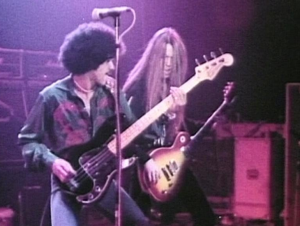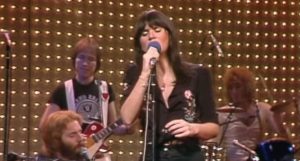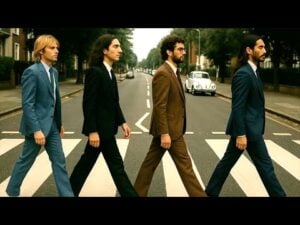Keith Richards Explains Why The Bands Was “Too Perfect” On Stage

via The Tonight Show Starring Jimmy Fallon / YouTube
The Rolling Stones’ charm partly stemmed from their raw and unrefined style. Originally a simple blues outfit, the band briefly dabbled in pop, as seen in songs like ‘Tell Me,’ before consciously shaping themselves into a grittier and more rebellious alternative to The Beatles.
Keith Richards, in particular, was proud of his band’s “noise”. As an early pioneer to embrace the fuzz pedal and employ it on the international chart-topper, “(I Can’t Get No) Satisfaction”, the iconic, yet abrasive, guitarist naturally has profound respect and adoration for the avant-garde folk icon Bob Dylan.
Although Richards had a deep appreciation for the raw and unpolished qualities present in Bob Dylan’s songs, he found it challenging to appreciate Dylan’s long-standing supporting ensemble, The Band.
“I witnessed them at Dylan’s performance on the Isle of Wight,” Richards disclosed in a 1969 interview with Rolling Stone. “I was left somewhat disappointed… They were just a little too perfect for me.”
“The Band were just too strict”
The Stone’s guitarist had a penchant for the spontaneous elements of live shows and felt that The Band was distinctly lacking in this regard.
“Dylan was beautiful, especially when he did the songs by himself. He has a unique rhythm which only seems to come off when he’s performing solo,” Richards praised The Bard in contrast.
He also observed that The Band’s performance appeared somewhat constrained, possibly due to their extensive history of playing together. The legendary guitarist couldn’t help but notice their tendency to replicate their studio recordings meticulously.
“I personally like some distortion, especially if something starts happening on stage. But they just didn’t seem to come alive by themselves. I think that they’re essentially an accompanying band. When they were backing up Dylan, there was a couple of times when they did get off. But they were just a little too perfect for me,” the man behind the iconic “Satisfaction” riff said.
The Band beyond The Bard
The Band is comprised of five understated sidemen – namely Robbie Robertson, Levon Helm, Rick Danko, Richard Manuel, and Garth Hudson – who transitioned into an autonomous group under the influence of Bob Dylan, the prominent figure beneath whose shadow they initially thrived.
During their summer residency on the New Jersey coast, when they were still known as Hawks, Dylan learned of their growing reputation and, after a collaborative session with Robertson, enlisted the group as his backing band for his first electric tour—a move that caused a stir among folk purists and eventually led to Helm’s departure due to the immense pressure.
In 1967, seeking a break from the intensity, Hawks (sans Helm) followed The Bard to Woodstock, New York. They congregated daily in the basement of a secluded ranch house known as “Big Pink” in nearby West Saugerties.
Upon Helm’s return, Bob Dylan encouraged “the Band,” as they had come to be known, to strike out on their own. The immediate outcome of this separation was 1968’s Music from Big Pink, an entirely original fusion of country, gospel, rock, and rhythm and blues. Their self-titled follow-up in 1969 will define their rustic character and would serve as a timeless distillation of the American experience.
The other musicians Richards did not like
Richards’ critique of The Band was notably restrained when considering his track record of criticizing fellow musicians.
He’s been unreserved in his disparagements, branding Elton John as inauthentic, expressing reservations about George Harrison and Paul McCartney’s contributions to The Beatles, and deeming Robert Plant’s singing as excessively extravagant. However, many of his harshest comments have been directed at his long-standing collaborator, Mick Jagger.
In his book Life, Richards remarked, “Mick got very big ideas. All lead singers do. It’s a known affliction called LVS, lead vocalist syndrome.” Richards has been hurling barbs at Jagger for decades, but despite their differences, they continue to collaborate within The Rolling Stones.
In contrast, Keith’s fellow Stone Ronnie Wood had a more favorable opinion of The Band. Wood joined the band in the closing number of their farewell concert known as The Last Waltz.













